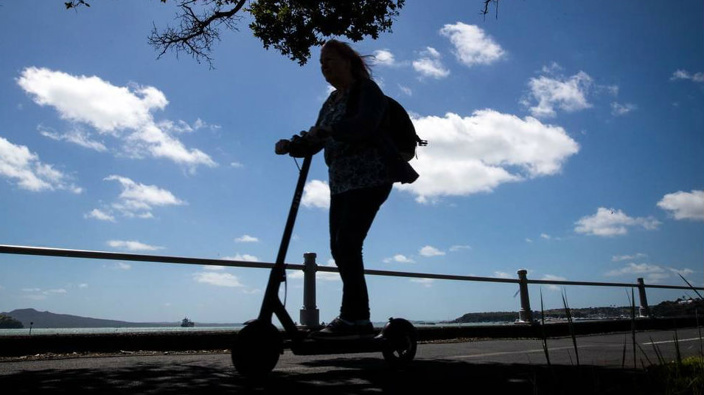Almost a fifth of Auckland e-scooter riders who ended up in hospital were drunk, according to a new study which found that the devices were four times more dangerous than bikes.
The study, published in the New Zealand Medical Journal today, compared data about e-scooter and bicycle injuries treated by Auckland City Hospital over a year and found the hospitalisation rate for e-scooter riders was about four times higher than for cyclists.
In the year to October 15, 2019 there were 69 people treated for injuries sustained while riding an e-scooter and 109 while riding a bike.
Lead author Matthew McGuinness, who was working at Auckland Hospital at the time, said the study came about because staff were noticing a lot of people coming in with e-scooter injuries and they wanted to find out if it was because they were more unsafe or if it was because there were alot of them around all of a sudden.
McGuinness said the team calculated the hospitalisation rate for e-scooter injuries as 326 hospitalisations per million hours spent on an e-scooter using data from Auckland Council who was monitoring the trial of the devices.
The best comparison was a previous study which found that, for cyclists in the Northland–Auckland region between 2003 and 2007, the hospitalisation rate was 78 per million hours spent cycling, he said.
"This comparison suggests a greater than four-fold higher risk of injury from e-scooters in the Auckland region," the study said.
And that doesn't take into account anyone else injured in an e-scooter collision.
McGuinness said he could not say for sure why that was but believed e-scooters were probably not used in the same way as bicycles.
"They are obviously novel so people are having a bit of fun on them rather than, with cycling, people using them for transport to work."
Most scooter injuries were caused by falls not involving any one else while most bicycle injuries resulted from collisions, the study showed.
Despite that, there was no real difference in the severity of injuries.
"The over representation of isolated falls is possibly due to the inexperience of e-scooter riders and the influence of alcohol," the authors wrote.
They found 18.8 per cent of all e-scooter riders hospitalised were over the legal drink driving limit despite less than half of them having their blood alcohol level tested. That compared to 6.4 per cent of cyclists who had alcohol in their blood.
The authors said the low number tested for alcohol likely resulted in an under representation of the true percentage of alcohol-related injuries in the data.
McGuinness said the fact 55 per cent of e-scooter injuries occurred after 5pm was likely linked to the high proportion of riders with alcohol in their system.
The study also found only about 10.1 per cent of e-scooter patients were wearing protective gear compared to 78.9 per cent of cyclists.
The authors concluded the high hospitalisation rate suggested e-scooter transport was currently "not as safe as cycling".
With the mode of transport becoming more common more restrictions were needed to keep riders safe, they said.
The study suggested councils consider zero tolerance for alcohol when riding them, laws regarding protective gear, restrictions on using e-scooters after 5pm and changes in road laws.
McGuinness said changes already made since the study was carried out backed up their findings.
Auckland City Council had imposed a 9pm curfew on the use of e-scooters in entertainment areas and an 11pm limit elsewhere in the city, he said.
"Based on this study I think both those things are really important and will hopefully decrease the number of hospitalisations especially in intoxicated people."
E-scooter hire company Jump, now also provides a helmet with each scooter but McGuinness supported making helmet use a law as it is for bike riders.
McGuinness said he expected the number of hospitalisations would likely drop as the novelty wore off and as people got more used to riding them and he planned to test that theory with a follow-up study once Covid restrictions had been removed for long enough to gather reliable data.
text by Amy Wiggins, NZ Herald
Take your Radio, Podcasts and Music with you










